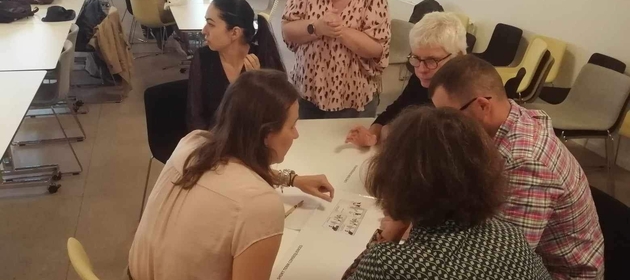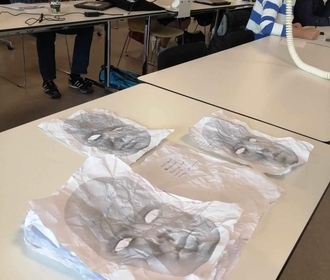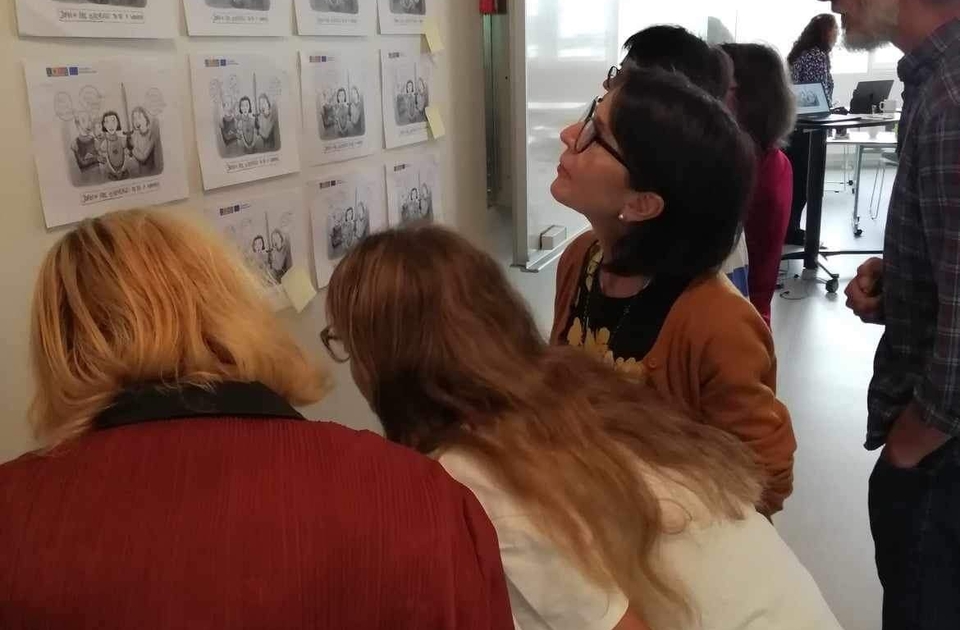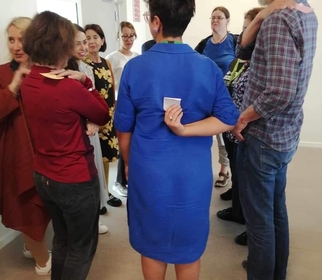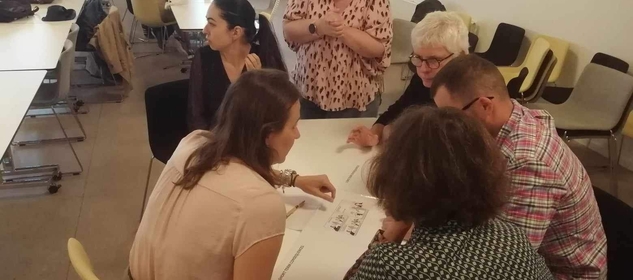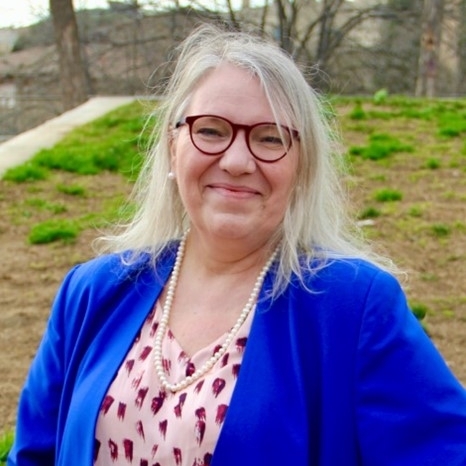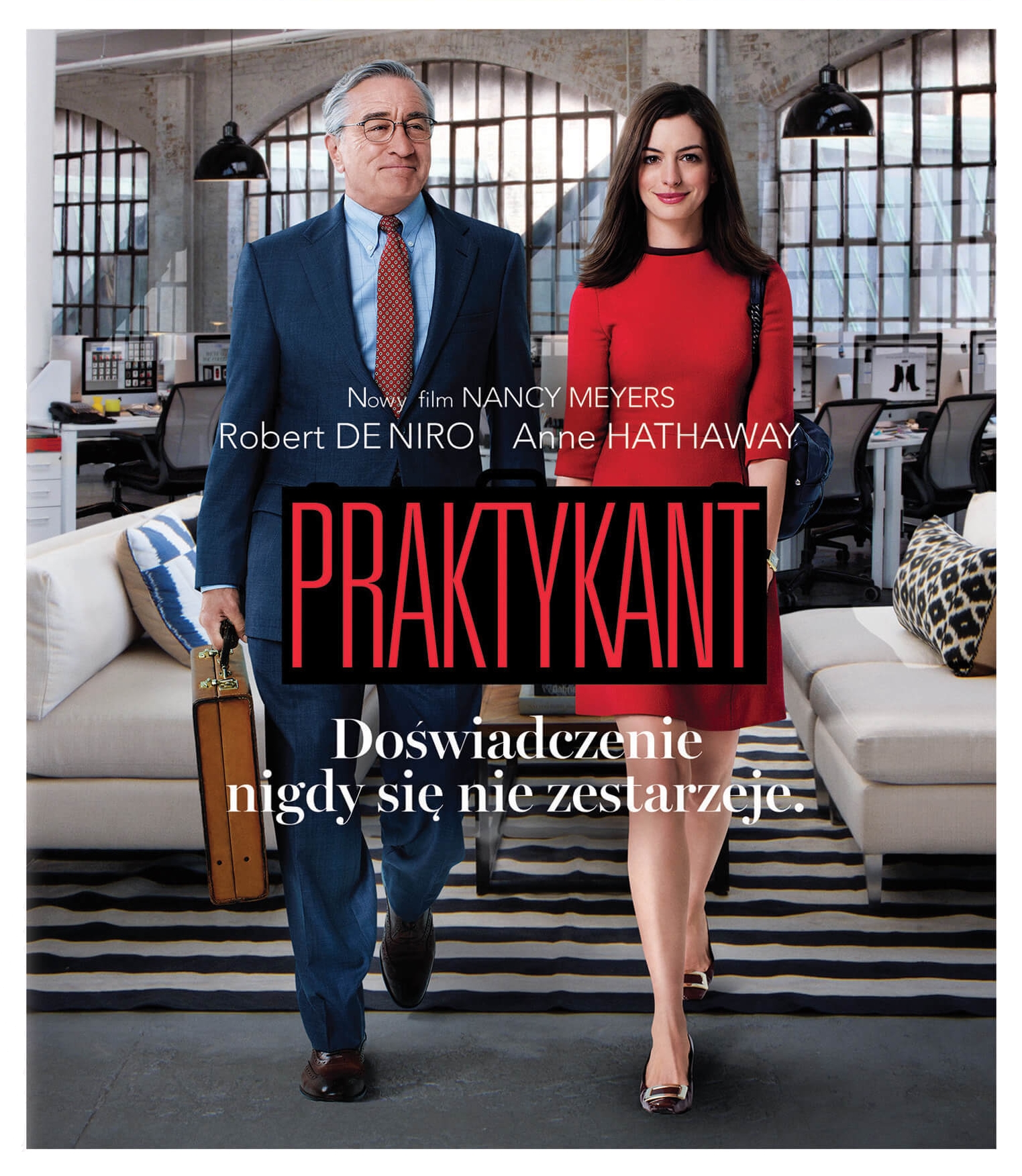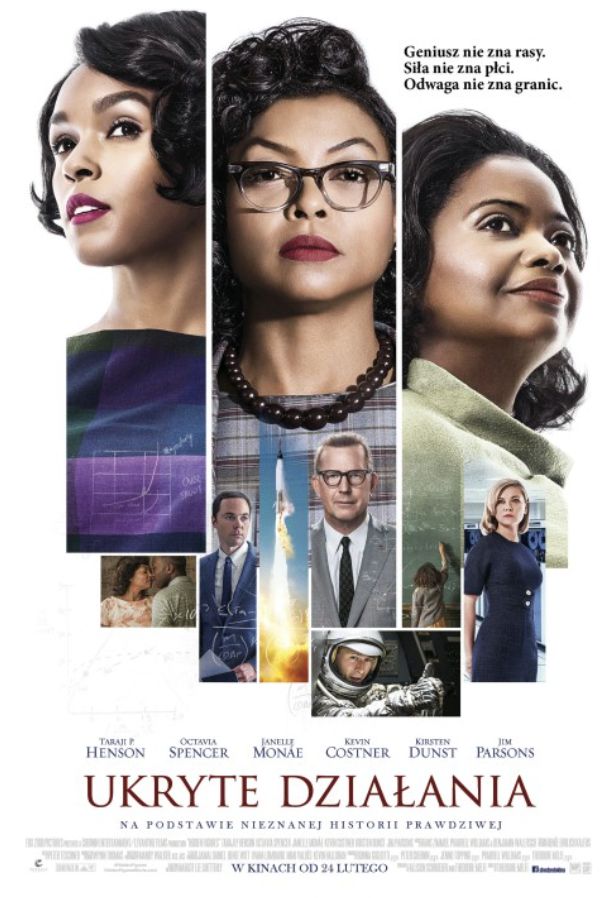EASY
Czas trwania projektu:
2021-12-01 - 2024-08-01
Lider projektu:
Uniwersytet Łódzki Wydział Nauk o Wychowaniu
Partnerzy projektu:
Aidlearn, Consultoria em Recursos Humanos LdaInstituto Politecnico de Braganca, Portugalia
HF & VUC FYN Dania
OLYMPIAKI EPAIDEFTIKI KAI SYMVOULEFTIKI EPE, Grecja
Nadrzędnym celem projektu EASY (realizowanego w ramach programu Erasmus+) jest promowanie wartości, postaw i zachowań przyczyniających się do wzmocnienia tożsamości europejskiej, aktywnego obywatelstwa, tolerancji i demokratycznego uczestnictwa dorosłych w kreowaniu świata opartego na spójności społecznej. Celem operacyjnym jest opracowanie, w oparciu o wyniki międzynarodowych badań desk research oraz wywiadów skoncentrowanych z edukatorami dorosłych, ram kursu wspierającego dorosłych edukatorów i uczących się w nabywaniu wiedzy i zdolności rozumienia mechanizmów stereotypizacji, będących podłożem dyskryminacji.
Rama kursu zwierać będzie 1/zestaw efektów uczenia się w obszarach wiedzy, umiejętności i kompetencji społecznych odniesionych do Europejskiej i narodowych ram kwalifikacji, opracowane zostaną 2/ metody ich walidacji i weryfikacji, zostaną także opracowane 3/ materiały metodyczne i dydaktyczne wykorzystujące filmy fabularne i komiksy zawierające obrazy stereotypów. Planowane: 1/Raport z badań desk research prowadzonych w państwach partnerów 2/ Raport z badań Focus Group wśród ekspertów edukacji
Koordynatorem projektu jest dr Wanda Baranowska (Uniwersytet Łódzki, Wydziału Nauk o Wychowaniu, Katedra Badań Edukacyjnych).
W dniach 19-21.09.2023 roku w ramach projektu Erasmus+ (EASY_ 2021-1-PL01-KA220-ADU-000032603) w Danii odbywają się warsztaty poświęcone tematyce stereotypów. Adresatami szkolenia są edukatorzy osób dorosłych pochodzący z krajów bezpośrednio zaangażowanych w realizację projektu (Bułgaria, Dania, Grecja, Polska, Portugalia). W trakcie spotkania WNoW UŁ, który jest koordynatorem projektu, reprezentują dr Wanda Baranowska i dr Małgorzata Kosiorek, przedstawicielami instytucji zajmujących się edukacją dorosłych w Polsce są dr Beata Owczarska (CRiE) i mgr Sebastian Skrobisz (CREWŁ).
Dr Wanda Baranowska – starszy wykładowca w Katedrze Badań Edukacyjnych – koordynator krajowy projektu. Pracę w uczelni wyższej rozpoczęła w 2003 roku, po ponad 20-letniej praktyce edukacyjnej i terapeutycznej. Aktualnie, realizuje zadania starszego wykładowcy skupiając się na doskonaleniu jakości prowadzonych zajęć dydaktycznych, zarówno pod kątem merytorycznym jak i metodycznym. Zakres problemowy prowadzonych przedmiotów wiąże się głównie z funkcjonowaniem dziecka, ucznia i dorosłego ze specjalnymi potrzebami edukacyjnymi (SPE), w tym z zaburzeniami neurorozwojowymi. Wśród prowadzonych przedmiotów dominują związane z procesem diagnozy oraz wspierania rozwoju ucznia w środowisku szkolnym i rodzinnym.
Poza prowadzeniem zajęć dydaktycznych angażuje się w działania badawcze i wdrożeniowe projektów międzynarodowych w ramach programu Erasmus +.
Główny trzon zainteresowań zawodowych tworzą wszelkie aspekty "edukacji włączającej", zwanęj także inkluzywną. W takim świetle analizuję potrzeby osób z zaburzeniami neurorozwojowymi, szczególnie z zaburzeniami w spektrum autyzmu, ADHD oraz zachowaniami opozycyjno- buntowniczymi. Interesują ją także warunki pracy, czynniki kształtujące nastawienia i zachowania nauczycieli wobec uczniów z zaburzeniami rozwoju i w relacji z takimi uczniami.
ABOUT THE PROJECT EASY
The project implementation time:
2021-12-01 - 2024-08-01
Coordinator:
Uniwersytet Łódzki Wydział Nauk o Wychowaniu
Partner organisation:
Aidlearn, Consultoria em Recursos Humanos LdaInstituto Politecnico de Braganca, Portugalia
HF & VUC FYN Dania
OLYMPIAKI EPAIDEFTIKI KAI SYMVOULEFTIKI EPE, Grecja
The project seeks to promote equal opportunities and access, inclusion, diversity and fairness across all its actions and is being developed against a background of unprecedented challenges and opportunities facing the world such increasing globalisation in order to end stereotypes. Our goal is for adults to understand the stereotypes that can lead to discrimination, improving the availability of high-quality learning opportunities for adults at the same time that will help the inclusion and diversity in all fields of education, training, youth and sports. In this interconnected world increasingly globalised, most people come into contact frequently with people of other cultures and from other parts of the world, are affected by events in other countries, have multiple global relationships (at work, in business, socially, through family ties, travel etc.), and will have to negotiate and collaborate across age, gender, social, cultural, ethnic, racial, political and geographic differences. We want to reach the largest number of adults, giving resources to their educators so that, when they are trained, they can send the message that making this discrimination is wrong, with a view to increasing accessibility and outreach to people with fewer opportunities and that had some barriers occurred as a result of discrimination. Our project will support, through lifelong learning, the educational, professional and personal development of people in Europe and beyond, thereby contributing to sustainable growth, quality jobs and social cohesion, to driving innovation, and to strengthening European identity and active citizenship, while promoting values of inclusion and diversity, tolerance and democratic participation, knowledge about shared European heritage and diversity. On the basis of the 2019 Eurobarometer on discrimination in the EU, age discrimination remains one of the most prevalent forms of discrimination. (40% of individuals in the EU consider that age discrimination is widespread in their country). Age discrimination in the field of employment, but it is also widespread in access to goods and services. Discrimination in access to health care is a particularly worrying area for people aged 55+, which was brought forward in the context of COVID-19. Gender is one of the most form of discrimination at work and at home (housekeeping chores, and children and elders care). Based on the 2019 Eurobarometer on discrimination in the EU, the majority of answers report that that women have children and have less time for work so they are not as available as they should, and there´s also thinking that women have worse leadership than men. Discrimination based on gender and age are present at work, at accessing services, everywhere, and it prejudices not only the people victim of this discrimination but the entire society, since it is a way to deny human rights to a part of population, and when not everybody has the same rights, it usually leads that more rights will be removed eventually; and also prevents people with opportunities to act in behaviours considered outside the stereotypes. Therefore, this is a need of adult society, which we want to attend with our project. We considered that providing training to adult educators is the fastest way to reach most of adults; and also having good presence in internet and social media, to reach adults directly. Also, adult educators expressed they need activities, resources, tools, created with adults as target, for help them to provide better education to their adult learners.
We have several aims with EASY project. Increase the quality of formal, informal and non-formal adult education, improve the quality of the adult education offer through professionalisation oi its staff and building capacity of adult education providers to implement high quality learning programs, and this way develop the quality of teaching and learning in all forms of adult education, and making it relevant to the needs of the European society at large. We want that adults understand what is the process of creation of stereotypes, how they can lead to discrimination, namely in gender and age discrimination, in different sectors of society (work, home, health services, etc.); and how they can be aware of this phenomenon and prevent discrimination; increase critical thinking in adults. We hope this would help to promote equal economic independence for women and men, closing the gender pay gap, advancing gender balance in decision making, ending gender based violence and promoting gender equality beyond the EU, and at the same time it would promote the equal treatment between persons irrespective of age, which would ban discrimination in the areas of social protection, education and access to goods and services making inclusion and diversity more accessible, for all, at all the levels. Create resources targeted to adults for adult educators.
Project Results: - PR1: EASY Course Framework. Includes the modules, learning outcomes, content and resources of course targeted to Adult Educators, on age and gender stereotypes. - PR2: EASY Films and Comic Strips Catalogue. Includes a minimum of 12 films (feature and short) and 12 comics (cartoon and/or comic strips), which portray the stereotypes addressed in the project - PR3: EASY Toolkit - Creation of activities to adult educators use on their adult education sessions. The activities will be based on short films, cartoons, comic strips – appealing stimulus – included in the catalogue. Minimum, we will select 5 films and 5 comics, and for each one selected, we will create 3 activities (minimum) to be monitored in adult education sessions - PR4: EASY Educators Guide, with suggestions on how to use the activities, how to embedded the thematic on other subjects. Other outcomes of the project are: EASY image and brand, so the Results are easily identified, and in order to be more appealing to target groups and stakeholders. EASY website, with information on the project and with all Results available to download for free.
Film „Praktykant” to kolejny z filmów w ramach problematyki projektu EASY (EASY_2021-1-PIKA220-ADU-000032603) programu Erasmus+, który łamie sterotypowe myślenie o roli kobiet i mężczyzn. Główna bohaterka odniosła ogromny sukces z własnym biznesem, mężczyzna zajmuje się domem i córką. "Praktykant" to Robert De Niro w roli kaznodziei savoir-vivre'u, w firmie, którą prowadzi kobieta.
Gdyby rzeczywiście dawniej mężczyźni i kobiety zachowywali się tak, jak to sugeruje reżyserka filmu - Nancy Meyers, ruch feministyczny nie miałby racji bytu…
CYKL FILMÓW "UKRYTE DZIALANIA"
Ku pokrzepieniu serc…? Jeden z filmów w ramach problematyki projektu EASY Educating, adults against stereotypes programu Erasmus+ (EASY _2021-1-PL01-KA220-ADU-000032603) pokazujący dyskryminację rasową w USA lat 60-tych. Sytuacja Afroamerykanek była szczególnie trudna. Trzy bohaterki przebiły się swoją inteligencją i pracowitością, choć kosztowało je to wiele wyrzeczeń i upokorzeń. Czy dzisiaj możemy czuć się pokrzepione…? Bezpieczne? My kobiety… różnych ras i wyznań…?

